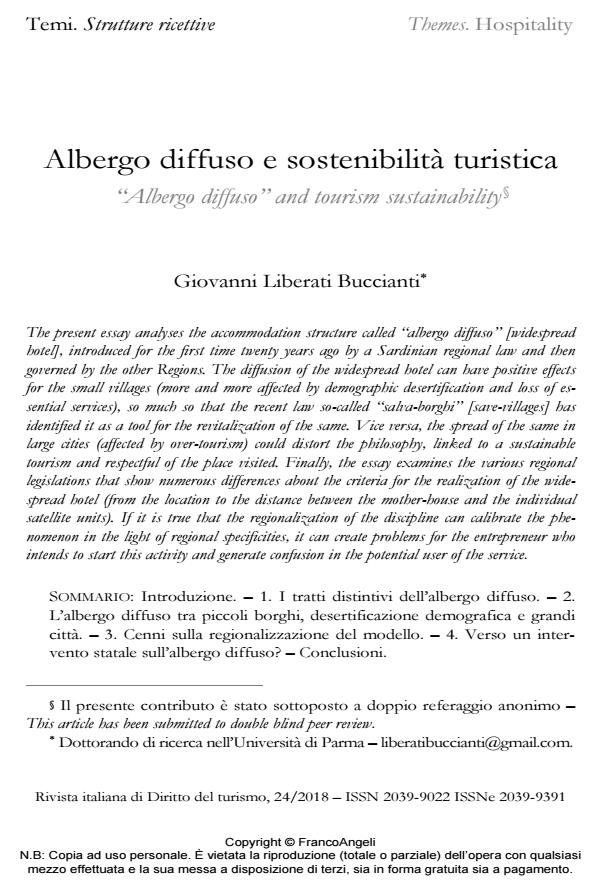"Albergo diffuso" and tourism sustainability
Journal title RIVISTA ITALIANA DI DIRITTO DEL TURISMO
Author/s Giovanni Liberati Buccianti
Publishing Year 2019 Issue 2018/24
Language Italian Pages 49 P. 385-433 File size 298 KB
DOI 10.3280/DT2018-024002
DOI is like a bar code for intellectual property: to have more infomation
click here
Below, you can see the article first page
If you want to buy this article in PDF format, you can do it, following the instructions to buy download credits

FrancoAngeli is member of Publishers International Linking Association, Inc (PILA), a not-for-profit association which run the CrossRef service enabling links to and from online scholarly content.
The present essay analyses the accommodation structure called "albergo diffuso" [widespread hotel], introduced for the first time twenty years ago by a Sardinian regional law and then governed by the other Regions. The diffusion of the widespread hotel can have positive effects for the small villages (more and more affected by demographic desertification and loss of essential services), so much so that the recent law so-called "salva-borghi" [save-villages] has identified it as a tool for the revitalization of the same. Vice versa, the spread of the same in large cities (affected by over-tourism) could distort the philosophy, linked to a sustainable tourism and respectful of the place visited. Finally, the essay examines the various regional legislations that show numerous differences about the criteria for the realization of the widespread hotel (from the location to the distance between the motherhouse and the individual satellite units). If it is true that the regionalization of the discipline can calibrate the phenomenon in the light of regional specificities, it can create problems for the entrepreneur who intends to start this activity and generate confusion in the potential user of the service.
Il presente saggio analizza la tipologia di struttura ricettiva denominata "albergo diffuso", introdotta per la prima volta vent'anni fa da una legge regionale sarda e poi disciplinata in seguito anche dalle altre Regioni. L’adozione del modello dell'albergo diffuso può avere effetti positivi per i piccoli borghi (sempre più colpiti dalla decrescita demografica e dalla perdita di servizi essenziali), tanto che la recente legge cosiddetta "salva-borghi" [salva-borghi ] lo ha individuato come uno fra gli strumenti per la rivitalizzazione dello stessi. Viceversa, la diffusione di tale modello nelle grandi città (interessate da turismo "eccessivo") potrebbe stravolgerne la filosofia, legata piuttosto ad un turismo sostenibile e rispettoso del luogo visitato. Infine, il saggio prende in esame le diverse legislazioni regionali caratterizzate da numerose differenze circa i criteri per la realizzazione dell'albergo diffuso (dall'ubicazione alla distanza tra la casa madre e le singole unità satellite). Se è vero che la regionalizzazione della disciplina potrebbe calibrare il fenomeno tenendo conto delle specificità regionali, ciò potrebbe però creare problemi all'imprenditore che intenda avviare questa attività e generare confusione nel potenziale fruitore del servizio
Giovanni Liberati Buccianti, Albergo diffuso e sostenibilità turistica in "RIVISTA ITALIANA DI DIRITTO DEL TURISMO" 24/2018, pp 385-433, DOI: 10.3280/DT2018-024002